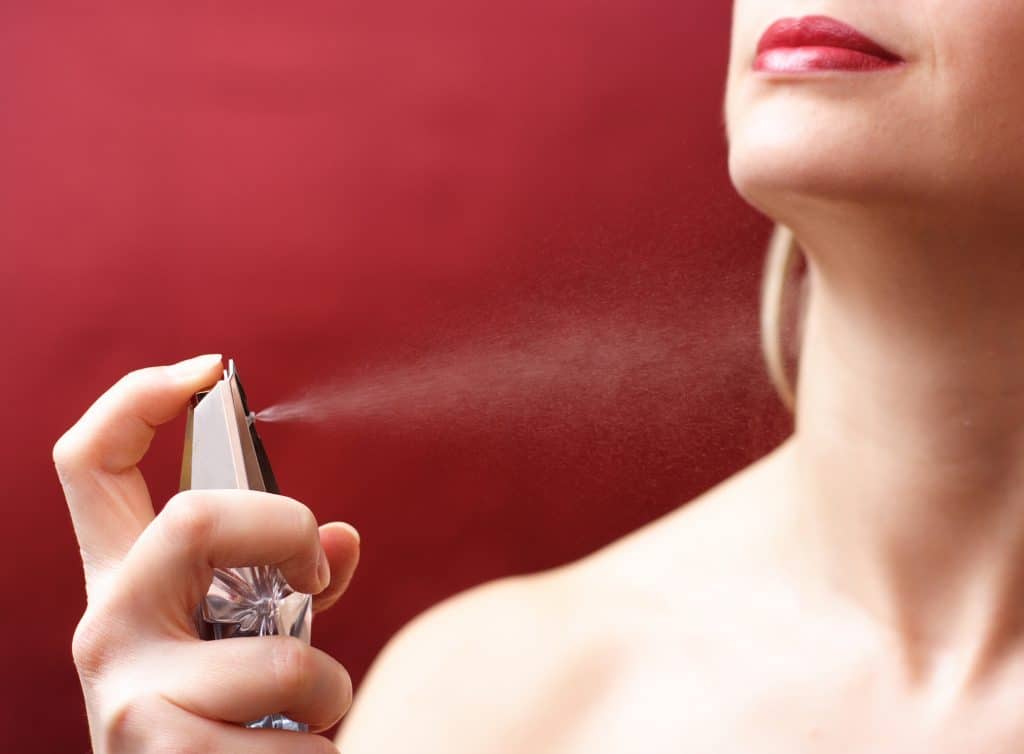One of the most distressing crises that can affect a perfume lover is not being able to smell your perfume anymore.
It happens to the best of us. You love a perfume and wear it to death, then one day you wake up and find that you just can’t smell it, no matter how deep you dig your nose in.
What gives? Why did that rich, luxurious smell that you smelt just a few weeks ago turn to little more than lightly-scented water?
The reason why you can’t smell your perfume anymore probably comes down to olfactory fatigue. This is when the nose becomes familiar with a smell and simply doesn’t register it anymore, saving your mind some extra energy.
Luckily, there are ways to combat olfactory fatigue.
Want to know more? Let’s take a closer look.
What Is Olfactory Fatigue?
Let me share a little personal anecdote.
When I first got into fragrances, I bought a bottle of Giorgio Armani’s Acqua di Gio Profumo after smelling it on a coworker. I loved it so much that I wore it almost every single day for months on end, and soon was more than halfway through my 75ml bottle.
Then, one day, I sprayed it on and noticed that something was off. That intense burst of scent that I was so used to just wasn’t there anymore. Had my bottle gone off? Was something wrong? I had to practically dig my nose into my arm to get even the faintest whiff.
Of course, my solution was to spray more so that I could smell it. But after a while, even that didn’t help.
However, my bottle of Acqua di Gio Profumo hadn’t changed. I had changed.
That’s olfactory fatigue, or rather olfactory habituation, in a nutshell.
Olfactory fatigue or habituation is a condition that arises when your nose becomes too familiar with a certain scent. It’s the same reason why you can’t smell your own particular “house smell” – you’ve become habituated to it.
The nose is constantly being exposed to olfactory stimuli, and processing those stimuli requires a certain degree of mental energy. Our minds are hardwired to detect scents that might present a danger to us – the smell of rotten eggs, for instance. However, when the nose is constantly exposed to scents that are pleasing, or rather “safe”, the need for exerting such mental energies becomes moot.
From a biological viewpoint, this is certainly an advantage. But for perfumistas and perfumistos like myself, it can be a nightmare.
What Causes Olfactory Fatigue?
But how and why did you develop olfactory fatigue towards a certain smell?
There are a few potential causes.
You Wear The Same Perfume Too Often
This might come as bad news to those one-perfume-only types (perish the thought), but if you can’t smell your perfume anymore, you’ve likely been wearing the same one too often.
As I mentioned before, the olfactory system is exposed to constant stimuli. After a time, it simply becomes more efficient not to register certain common smells, like the smell of your own body odor, house, or, yes, that perfume you wear every day.
Simply changing up the perfume you wear (if you’ve got more than one) or taking a break from wearing perfume is the simple solution to the problem. Once your nose is no longer habituated to the scent, you should be able to smell it like you did before.
You Spray Too Much, and In the Wrong Places

A common trap that most, shall we say overzealous perfume enthusiasts (not that I know anyone like that…) fall into is wearing too much perfume.
I get it, I really do. You love the scent, you want it to smell intense, and you want everyone around you to smell it. Unfortunate as it is, though, wearing too much perfume can be a one-way ticket to olfactory fatigue.
Just like the nose becomes adapted to common, everyday smells, it can also selectively decide not to process particularly powerful smells as a means of saving your brain undue stress.
It also has a lot to do with where you apply your perfume. If you apply your perfume on your neck and chest, your nose is a lot more likely to get overwhelmed.
So what’s the solution?
If you’re experiencing olfactory fatigue from spraying on too much perfume, simply spray less. If you usually wear 5-6 sprays of perfume, try 2-3 instead. Be aware of where you spray as well – try applying your perfume to your wrists, behind your knees, or on clothes instead of on your neck and chest.
You’re Recovering From Sickness
Certain illnesses, such as respiratory conditions, sinus infections, or COVID-19, can have a deleterious effect on the nose and its perception of scent.
Fragrances that once smelled bright and rich and beautiful might smell dull and muted now in the wake of your illness. In most cases, these symptoms will fade with time, but it is possible that long-term nerve damage can result from particular conditions. COVID-19 especially has been observed to affect smell and taste in ways that are still being understood.
If you are recovering from an illness and are unable to smell your perfume, the best solution might be to wait until your body fully recovers. If symptoms persist for an extended period of time, however, contact your physician for further guidance.
Other Factors To Consider
There are some other potential explanations for why you might not be able to smell your perfume anymore.
One is that some kind of damage occurred to the perfume itself. This can happen if the perfume is kept in an environment where it is exposed to regular fluctuations in temperature and humidity, such as in the bathroom or in a car.
The volatile top notes of a perfume can be damaged, affecting the molecular structure of the fragrance, and hence, changing the way that you smell it.
Another possibility to consider is the weather and season. Some perfumes are simply ill-suited for different types of weather. A fresh, citrus fragrance like Dolce & Gabbana’s Light Blue simply wouldn’t stand a chance in a snowstorm. By the same token, hot, sticky, humid weather also tends to obliterate fragrances from the skin.
If you can’t smell your fragrance anymore, make sure that you store it in a dark and preferably cool environment in the future. Also take the weather and season into consideration – notably hot and humid or cold and dry weather can take a toll on your perfume.
The Final Word
Not being able to smell that perfume you love so much can be distressing, but thankfully it doesn’t last forever (does anything?). There are a number of ways to deal with olfactory fatigue and olfactory habituation so that you can keep on sniffing that sweet, sweet smelly water.
Olfactory fatigue is likely the cause of your not being able to smell your perfume. If you’re experiencing olfactory fatigue, try to switch up your perfume, limit the amount of sprays you apply, consider the weather and season, and, if you’re recovering from an illness, allow yourself to recover.




